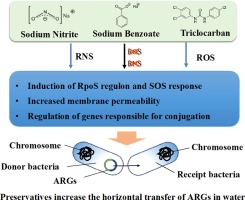Environment International ( IF 11.8 ) Pub Date : 2020-03-12 , DOI: 10.1016/j.envint.2020.105544 Tianyu Cen , Xinyu Zhang , Shanshan Xie , Dan Li

|
Increasing concentrations of preservatives have been detected in environments due to the overuse and misuse of preservatives in food and personal care products. Recent studies have relied heavily on the toxicity, biodegradability, and fate of preservatives in the environment. However, the biological effects of preservatives on antimicrobial resistance, which poses great threats to public health worldwide, are largely unknown. This study investigated three preservatives for their ability and mechanisms of promoting horizontal transfer of antimicrobial resistance genes (ARGs). The results demonstrated that these preservatives (sodium nitrite, sodium benzoate, and triclocarbon), under daily-use concentrations, led to concentration-dependent increases in conjugative transfer by 1.24–2.63, 6.79–7.05, and 2.17–4.31 folds compared with the control group. Even these three preservatives had different patterns on generating intracellular reactive oxidative species (ROS) and reactive nitrogen species (RNS), all of them could stimulate radical-induced RpoS regulon and SOS response, increase cell membrane permeability, and regulate conjugative transfer-related genes, subsequently promoting horizontal transfer of ARGs. The present results expanded the understanding of biological effects induced by preservatives, and provided mechanistic insight into the preservatives-induced resistance. This study also opens an intriguing question on the roles of emerging contaminants including preservatives in the emerging and spread of ARGs in various environments.
中文翻译:

防腐剂通过差异机制促进质粒介导的抗菌素耐药基因的水平转移
由于食品和个人护理产品中防腐剂的过度使用和滥用,已经在环境中检测到防腐剂的浓度不断增加。最近的研究严重依赖于环境中防腐剂的毒性,生物降解性和命运。然而,防腐剂对抗菌素抗药性的生物学效应是未知的,这对全世界的公共卫生构成了巨大威胁。这项研究调查了三种防腐剂的能力和促进抗菌素耐药基因(ARGs)水平转移的机制。结果表明,在日常使用浓度下,这些防腐剂(亚硝酸钠,苯甲酸钠和三氯碳)导致结合转移的浓度依赖性增加了1.24 – 2.63、6.79 –与对照组相比,分别为7.05和2.17 – 4.31倍。即使这三种防腐剂在产生细胞内反应性氧化物质(ROS)和反应性氮物质(RNS)方面也具有不同的模式,它们都可以刺激自由基诱导的RpoS调节剂和SOS反应,增加细胞膜通透性并调节与转导相关的基因,随后促进ARG的横向转移。目前的结果扩大了对防腐剂诱导的生物学效应的理解,并提供了对防腐剂诱导的抗性的机理性见解。这项研究还就新出现的污染物(包括防腐剂)在各种环境中ARG的出现和扩散中的作用提出了一个有趣的问题。



























 京公网安备 11010802027423号
京公网安备 11010802027423号